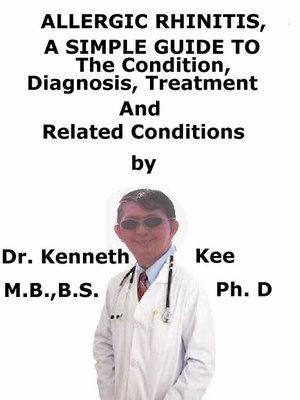Allergic Rhinitis a Simple Guide to the Condition, Diagnosis, Treatment and Related Conditions
ebook
By Kenneth Kee

Sign up to save your library
With an OverDrive account, you can save your favorite libraries for at-a-glance information about availability. Find out more about OverDrive accounts.
Find this title in Libby, the library reading app by OverDrive.



Search for a digital library with this title
Title found at these libraries:
| Library Name | Distance |
|---|---|
| Loading... |
Allergic rhinitis is a medical disorder of allergic effects affecting the nose.
These allergic conditions occur when the patient breathes in something he or she is allergic to such as dust, animal dander or pollen.
Symptoms can also happen when the patient eats a food that he or she is allergic to.
Most allergic rhinitis disorders are due to plant pollens.
This form of allergic rhinitis is often called hay fever or seasonal allergy.
An allergen is something that activates an allergy reaction.
Hay fever is an allergic response to pollen.
Plants that produce a hay fever reaction are trees, flowering plants, grasses and weeds.
The pollen from the plants is transmitted by the wind.
Types of Rhinitis:
A. Allergic rhinitis
Episodic rhinitis
1. Occupational rhinitis (allergen)
2. Perennial rhinitis
3. Seasonal rhinitis
B. Non-allergic rhinitis
1. Atrophic rhinitis
2. Chemical- or irritant-induced rhinitis
3. Drug-induced rhinitis
a. Antihypertensive medications
b. Aspirin
c. Non-steroidal anti-inflammatory drugs
d. Oral contraceptives
e. Rhinitis medicamentosa
4. Emotional rhinitis
5. Exercise-induced rhinitis
6. Gustatory rhinitis
7. Hormone-induced rhinitis
a. Pregnancy
b. Oral Contraceptive
8. Infectious rhinitis
9. Non-allergic rhinitis with eosinophilia syndrome (NARES)
10. Occupational rhinitis (irritant)
11. Perennial non-allergic rhinitis
a. Vasomotor rhinitis
12. Reflux-induced rhinitis or gastroesophageal reflux disease
Symptoms that occur:
a. Itchy nose, mouth, eyes, throat, skin or any area
b. Problems with smell
c. Runny nose
d. Sneezing
e. Watery eyes
Allergy testing may show the pollen or other substances that trigger the symptoms.
1. Skin testing
2. If the doctor finds that the patient cannot have skin testing, special blood tests may help with the diagnosis.
3. The tests are known as IgE RAST tests and can measure the levels of allergy-related substances.
4. A full blood count (FBC) test involving the eosinophil count
Treatments for allergic rhinitis are:
Antihistamines
Nasal corticosteroid sprays
Decongestants
Leukotriene inhibitors
Allergy shots (immunotherapy)
TABLE OF CONTENT
Introduction
Chapter 1 Allergic Rhinitis
Chapter 2 Causes
Chapter 3 Symptoms
Chapter 4 Diagnosis
Chapter 5 Treatment
Chapter 6 Prognosis
Chapter 7 Vasomotor Rhinitis
Chapter 8 Rhinosinusitis
Epilogue
Allergic Rhinitis is a very common condition in all ages.
Some childhood Vasomotor Rhinitis improves after puberty.
Others go on to adulthood.
The most obvious symptom is sneezing or stuffy nose every morning which slowly improves by late morning.
Allergic Rhinitis may result in chronic sinusitis due to chronic nasal infections.







